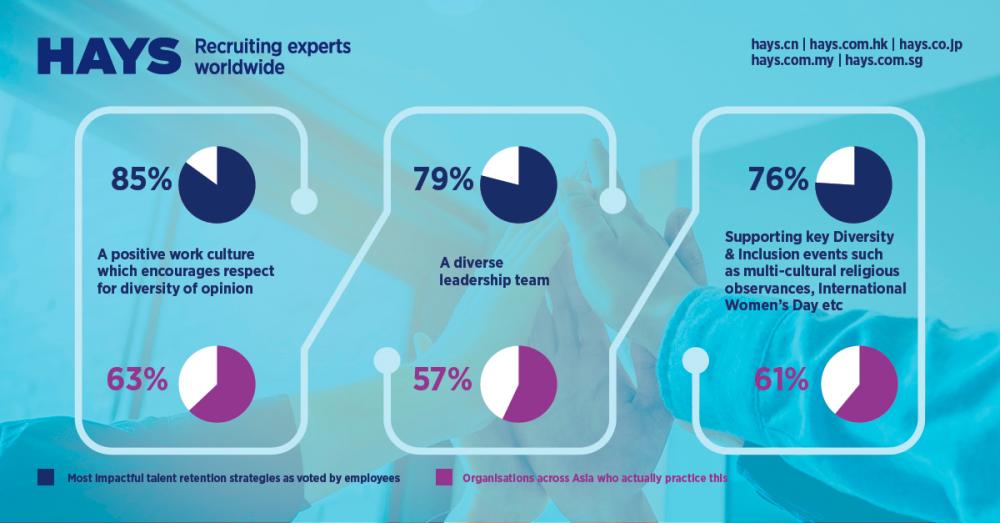PETALING JAYA: An overwhelming majority of working professionals across Asia, including Malaysia, considered a workplace culture that encouraged and rewarded diverse opinions as the most crucial element in retaining top talent, according to the latest Diversity & Inclusion (D&I) report by recruitment firm Hays.
About 86% of respondents in Malaysia believed building a positive workplace culture that encourages respect and regard for diversity of opinion has a positive effect on talent retention; but only 65% said their organisations already practiced this – the lowest number in Asia after Japan.
In terms of leadership, 72% said their leadership team was diverse, and 80% considered a diverse leadership team to have a positive impact on the retention of more diverse talent.
But when it comes to developing under-represented groups into leadership roles, 40% disagreed that their companies did so, a rise from 30% in 2018, with a further 27% unsure of their organisation’s position.
Looking to the future and for ways that companies can better support diversity of opinion, Malaysian respondents (47%) were well above the Asia average (40%) in thinking that collaborative roundtable employee forums and discussions are an important strategy.
Hays Malaysia managing director Tom Osborne said as knowledge of workplace D&I matures, employees are engaging on a level never seen before, evolving their comprehension of not just how their working lives can be enhanced, but how the organisation too can be improved.
“The results of our report show an increasing onus on business leaders to match employee expectations by encouraging and rewarding more diversity of opinion and driving change on an organisational level.”
Across Asia, about 85% of survey respondents believed that a “workplace culture that encourages respect for diversity of opinion” was the most positive and impactful employer action to retain top talent. Additionally, 53% also voted “rewarding and internally communicating ideas and contributions from diverse employee groups” as the most impactful action an organisation could take to further seek and support diversity of opinion. About 63% felt their organisations had such a workplace culture in place, which, while encouraging, leaves much room for improvement.
About 76% of respondents also felt that supporting key D&I events such as multi-cultural religious observances and international women’s day was a key element in building an inclusive workplace culture, with 61% saying their organisations already practiced this.
The second most impactful practice for retaining top talent was “having a diverse leadership team”, voted by 79% of respondents. However, only 57% of respondents felt their organisations already had this in place. About 71% said actively working to develop under-represented groups specifically into leadership groups would most impact talent retention, but only 38% of organisations practiced this.
These figures show significant gaps when it comes to encouraging diversity through leadership, compounded by 61% of respondents saying their leaders were biased towards promoting people who think look or act like them. Similarly, 80% said providing leaders with training to mitigate bias would be a positive step forward.
Currently, the majority of employers (79%) conduct employee feedback surveys as a safe channel to propose alternative viewpoints, which was also regarded by 49% of respondents as a positive action. Organisations also regarded exit interviews (62%) and F2F town hall meetings with mixed groups (47%) as effective channels to encourage diverse opinions; while employees regarded the chance to comment on organisational culture during their review/appraisals (47%) and collaborative roundtable employee forums and discussions (40%) as important steps organisations can take to further foster diversity of opinion in the future.
The findings of the 2019/2020 version of this annual report are based on survey responses from close to 2,000 working professionals based in China, Hong Kong SAR, Japan, Singapore and Malaysia. About 87% of respondents were born in Asia, 54% were female, and 39% held managerial positions. The survey covered personal experiences of the respondents with D&I in their workplaces, as well as their perceptions of its practice within and impact on their organisations.














